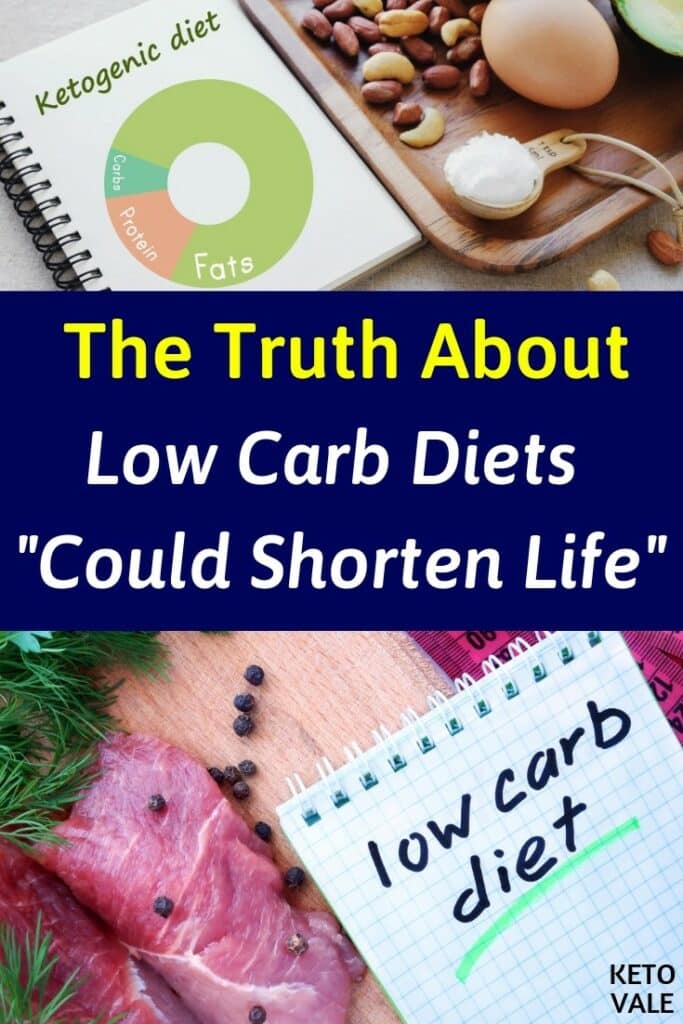A recent study published in the Lancet Public Health Journal, entitled “Dietary carbohydrate intake and mortality: a prospective cohort study and meta-analysis” (by S. B. Seidelmann, B. Claggett, S. Cheng, et al.) made the news, claiming that both low- and high-carb consumption shorten lifespan.
As with many similar studies, it provoked lots of attention and made a few headlines – and got a fair amount of people worried about their dietary choices. But it’s worth asking ourselves: what does the study actually tell us?
Is it such bad news for people following a low-carb or a ketogenic lifestyle, or are there any important considerations to make before we worry about the way we eat?
Let’s look into the details.
What Was Defined As “Low-Carb” In The Study?
According to the study, the term “low-carb” was defined as 37-39% of calories coming from carbs.
Doesn’t that sound incredibly high to you? Especially if you compare it to the keto diet?
Yes – it is.
It’s simply a somewhat low-ER carb variation of the Standard American Diet, more than anything else.
This essentially means that this study doesn’t give any accurate data on actual low-carb diets, and especially not on the keto diet, where you usually restrict carbs to under 25 g net carbs a day.
It doesn’t take into consideration even classic low-carb diets (higher than keto but still low overall), for example a diet where you consume less than 100 g net carbs a day (just as an example of an eating style that still counts as low-carb – of course, that figure might be higher or lower depending on each individual’s specific preferences).
100 g net carbs a day for someone who consumes a 2,000-calorie diet would translate into 400 calories from carbs, which is 20% carbs. Still much lower than the 37-39% quoted in the study.
As for keto macros, 25 g net carbs for someone on a 2000-calorie diet translates to 100 calories, which is 5% carbs. Much, much lower than 37%.
So What Does The Study Tell Us About People Who Follow Actual Low-carb Diets Or Keto?
Nothing, really.
It just makes general observations on people consuming a diet average in carbs (50-55% of the total calories coming from carbs), comparing them to people consuming a slightly lower or a slightly higher amount of carbs.
So if you’re following a keto diet – or even just a classic low-carb one – you shouldn’t feel concerned by the study, as it simply doesn’t provide any detailed information on these two ways of eating.
And, as we know, percentages are not always very useful – it’s much better to use macros as grams and look at daily calories.
Correlation Does Not Equal Causation
If two facts exist together and appear to be somehow related, it doesn’t mean that one caused the other.
For example, let’s assume that people who often go on holidays to exotic places also enjoy better dental health in old age – does that mean that going on a holiday to a tropical country will somehow improve your dental health? Of course not. It probably means that higher income individuals might have an overall better access to dental care – and even that is just a guess, if we don’t have any additional information. It might mean plenty of other things, too.
The same goes for this study – the fact that more people on a low-carb diet (again, low-carb being very loosely defined) died than those on a moderate carb one, does not in any way mean that their diet was the actual cause for that.
In fact, they might have had a number of pre-existing conditions, which made them go on a low-carb diet, or might have demonstrated other types of behaviour that typically shorten life, such as smoking, consuming more alcohol, not being physically active, and so on.
Successfully analyzing complex data and taking into consideration all the nuances and not making any blanket statements is extremely difficult. Using only observational data to draw conclusions about causality is a questionable method – and won’t provide much information on the actual causes of a given observed phenomenon.
It Relies On People Self-reporting Their Eating Habits And Patterns
And we know how inaccurate this can be. The study used food frequency questionnaires (FFQs), which ask participants to estimate how often they eat (a serving of) a given food, ranging from never or less than once a month to six times per day or more.
On the basis of that, approximate carb consumption was estimated. If you’re used to meticulously tracking your own food, you probably know how inaccurate any other information about food consumption can be, if it isn’t controlled in any way.
Serving sizes when roughly estimated can vary widely. The frequency of consumption of a given food might not be accurately reported – or even remembered. People are notoriously bad with accurately reporting their food consumption – they tend to over- or underreport certain foods based on their subjective perception on how “good” or “bad” these foods are.
Drawing important conclusions from people’s self-reported eating habits without actually having any control on the actual food that people were eating, or without being able to observe it directly, definitely has many flaws and is often criticized as an analytic strategy.
Regarding the results, we need to consider a few things in perspective. One positive effect of this study is that it’s bringing new life to the low-carb vs. high-carb discussion – and even though we might disagree with its conclusions, it’s an important milestone in the debate.
A Few Things To Consider When Looking At The Results Of The Study:
- For people who restrict carbs, their intake of fresh fruits and vegetables can easily go down
And we know that these are extremely nutrient-rich – especially veggies. Eating a diet that is somewhat lower in carbs (30-40% of total calories) and that mostly consists of processed foods and no fresh vegetables is likely not going to do miracles for your health in the long run – and that hardly comes as a surprise.
Eating a genuinely low-carb diet with plenty of fresh produce and nutritious low carb vegetables, and which consists mostly of whole, natural food? That’s a completely different story. And the study doesn’t go into the details about the type of carbs that were consumed. Nor about their quality. Which leads us to the next point:
- The quality and exact type of nutrients is arguably just as important as the quantity, if not more
As pointed out, cutting highly processed foods, and instead concentrating on whole, natural, minimally processed foods, is almost always a winning strategy. Making sure that your food comes from good sources and that it’s of good quality is equally important.
While not everyone is able to afford organic food (and while the differences between organic and conventionally produced might not always be worth the extra money), making an effort to find the best food for your budget is an important step in the right direction. None of these things were considered in the study.
Furthermore, on a well-formulated ketogenic meal plan, you will be eating many whole, nutritious and low carb foods and avoiding processed ones, unless you choose to do “dirty keto”.
- People who go on a diet and are restricting carbs – or fats – might already have existing health issues.
They might already be obese, have diabetes, suffer from high blood pressure, and overall have a different risk profile than the general population. Naturally, all of these factors can contribute towards a shorter lifespan. Some of these factors were accounted for, for some of the respondents, but not all of them at once, and not the same set of factors was considered for all of the people who participated.
- Nutrition science is evolving all the time and studies get disproven & debunked practically all the time
Nutrition science is constantly evolving and new data and new ways to interpret data become available all the time. It’s important to look at studies in order to make sure that you’re making the right choices for your own circumstances – and to keep up to date with the latest findings – and we’re all for a scientific approach to nutrition.
Nevertheless, it’s also important to consider the limitations of observational studies like this one, where the respondents’ actual food intake wasn’t monitored and where only the most extreme entries were dismissed (i.e. the ones under 600 or above 4200 kcal for men and under 500 or above 3600 kcal for women), leaving the door open for many possible errors, miscalculations and subsequent misinterpretations.
It’s also important to remember that any study’s conclusions aren’t written in stone – studies aim to gather data to prove or disprove a certain hypothesis, or to provide new perspectives for existing problems. We’re gaining a better understanding of our nutrition as we go, and while this study is a milestone in the discussion, it doesn’t provide any actual information on people who make the decision to eat a truly low-carb diet based on high-quality, natural, minimally processed low-carb foods.
Our conclusion
Humans are extremely adaptable to their environment and its specific conditions and can thrive on many different diets, including high, moderate and low-carb ones. While observational studies like the one published in the Lancet Public Health Journal provide no actual insight on low-carb diets (and especially not on keto), they’re still an important part of the discussion.
The specific macronutrient composition of your diet will depend on your preferences and goals – we don’t believe in the “one size fits all” approach. However, one thing is certain – there is no reason to doubt your dietary choices based on the study, as it has a number of flaws and allows for a number of possible misinterpretations, as discussed above.
If you’re eating whole, natural foods that provide you with enough protein and energy to thrive, while being mindful of your total caloric consumption, you’re on the right track.
The keto diet (and low-carb diets in general) have been shown to have a number of important health benefits, especially for people who are overweight, suffer from diabetes, have high blood pressure, or insulin resistance, or other related conditions. Additionally, they are among the best diets out there if you’re trying to lose weight and regulate your blood sugar levels.
Those benefits have been demonstrated time and again in many controlled studies (and not just observational ones), and there are thousands and thousands of success stories available online.
So far, we don’t really see a plausible mechanism by which low-carb diets could shorten life, given that in the first place they improve your health and quality of life, sometimes drastically. Do you? If you’re interested in the science behind low carb and ketogenic diets, check this list of studies! You’ll be glad that you did.
Enjoy this post? Share to save for later!

Photo credit: designer491/Depositphotos.com







